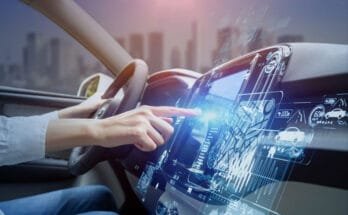Electric Vehicles: The Future of Mobility
In recent years, electric vehicles (EVs) have emerged as the cornerstone of the automotive industry’s evolution, driving innovations in technology and reshaping transportation dynamics. The push towards environmentally sustainable transport has accelerated the development and adoption of EVs across the globe. Major manufacturers have launched a variety of new models in the past year, bolstering consumer choice and pushing the boundaries of performance and design. Models such as the Tesla Model Y, Ford Mustang Mach-E, and the Rivian R1T have garnered attention for their unique features and capabilities, making the shift to electric driving increasingly attractive.
One of the critical aspects of the growth in electric mobility is the continuous improvement in battery technology. Advancements in lithium-ion batteries have resulted in increased energy density, extended range, and faster charging times. New technologies, including solid-state batteries and improved thermal management systems, are being researched and implemented by manufacturers, suggesting a future where EVs can be charged in minutes rather than hours. This progress addresses one of the primary concerns potential buyers have regarding the practicality of electric vehicles.
Supporting this technological revolution is the expanding charging infrastructure. As more EV charging stations are installed in urban, suburban, and rural areas, the convenience of owning an electric vehicle increases significantly. Governments worldwide are investing in expanding this charging network to alleviate range anxiety and encourage consumer adoption of electric vehicles.
Beyond technology and infrastructure, the environmental impact of EVs is profound. By reducing greenhouse gas emissions and reliance on fossil fuels, electric vehicles play a crucial role in addressing climate change. Furthermore, numerous governments have introduced incentives such as tax credits and rebates to promote the transition to electric mobility, further driving their adoption.
Major automotive manufacturers are strategically investing in EV technology, showcasing their commitment to a sustainable future. Collaborations with technology firms and startups, as well as investment in research and development, indicate a fierce competition within the industry to lead the electric vehicle market.
Autonomous Driving Technologies: Progress and Challenges
The automotive industry is witnessing significant advancements in autonomous driving technologies, propelled largely by artificial intelligence (AI). Self-driving vehicles are being developed with sophisticated sensor systems and machine learning algorithms that enhance safety and efficiency. The integration of AI allows vehicles to interpret real-time data from their surroundings, providing a more reliable navigation experience. Recent innovations, such as advanced radar and camera systems, are enabling these vehicles to better comprehend complex driving environments, paving the way for mainstream adoption.
However, the journey towards widespread acceptance of autonomous driving is fraught with challenges. Regulatory hurdles remain a critical concern as governments grapple with how to legislate and certify self-driving technologies. Differing regulations across jurisdictions can pose difficulties for companies attempting to deploy and test their autonomous vehicles. Furthermore, incidents involving self-driving cars, including accidents during testing phases, have raised public awareness and skepticism towards this innovative technology. Any negative media coverage can significantly impact consumer confidence and acceptance, ultimately affecting market growth.
Industry experts predict that for autonomous driving technologies to flourish, stakeholders must address these regulatory challenges while prioritizing safety improvements. Collaboration between automotive manufacturers, tech developers, and regulatory bodies is essential to create a cohesive framework that ensures responsible testing and deployment of self-driving vehicles. Moreover, educational initiatives aimed at the public can help mitigate fears, facilitating a gradual shift in perceptions toward the safety and reliability of autonomous vehicles.
In conclusion, while the progress in autonomous driving technologies is promising, addressing the regulatory and public perception challenges will be fundamental in advancing integration into our everyday lives. Continued investment and innovation in AI can lead to safer, more efficient transportation solutions, ultimately reshaping the future of mobility.
Sustainability in Automotive Manufacturing
The automotive industry is undergoing a significant transformation as it embraces sustainability in manufacturing practices. This shift prioritizes not only environmental responsibility but also economic viability. One of the key advancements is the increased utilization of recycled materials in vehicle production. Manufacturers are now incorporating recycled plastics, metals, and glass into their vehicles, significantly reducing the demand for virgin materials. This practice not only minimizes waste but also lowers the carbon footprint associated with sourcing and processing raw materials.
In tandem with this shift towards recycled materials, the implementation of renewable energy sources in production processes has become a central focus. Automakers are increasingly investing in solar, wind, and other renewable energy options to power their manufacturing plants. For instance, some leading companies have achieved significant milestones by committing to 100% renewable energy in their production facilities. This transition not only helps to reduce greenhouse gas emissions but also aligns with the growing consumer demand for environmentally friendly products.
Case studies of notable companies illustrate these advancements in sustainable manufacturing. For example, a well-known automaker has adopted a circular economy model, where end-of-life vehicles are dismantled, and materials are reused in new production processes. This approach not only conserves resources but also fosters innovation in product design, enabling the development of more sustainable vehicle options. Additionally, consumers are increasingly prioritizing environmentally friendly choices, triggering manufacturers to enhance their sustainable offerings. This responsiveness to consumer demand signifies a pivotal shift in the automotive landscape, where sustainability is becoming integral to a brand’s identity and competitive edge.
Through these evolving practices, the automotive manufacturing industry is poised to make substantial contributions to a more sustainable future, addressing both environmental challenges and consumer expectations.
Future Trends: Connectivity and Smart Technology in Cars
The automotive industry is experiencing a remarkable transformation due to the integration of connectivity and smart technology. As vehicles evolve into sophisticated systems, in-car entertainment has witnessed substantial advancements. Sophisticated infotainment platforms now offer seamless access to a multitude of applications, including navigation, music streaming, and real-time traffic updates. This ecosystem allows drivers and passengers to remain connected while on the move, significantly enhancing the overall travel experience.
Moreover, vehicle-to-everything (V2X) communication is set to redefine interactions among vehicles, infrastructure, and personal devices. By facilitating real-time communication between vehicles and their environment, V2X technology contributes to improved traffic management, reduced congestion, and enhanced safety measures. For instance, vehicles equipped with V2X capabilities can “talk” to traffic signals to optimize stoplight changes, thereby reducing waiting times and improving fuel efficiency.
In terms of driver safety, emerging technologies such as advanced driver assistance systems (ADAS) leverage connectivity features to provide real-time assistance with tasks such as lane-keeping and automatic emergency braking. These innovations are designed to mitigate accidents and ensure a safer driving environment for all road users.
However, the increasing connectivity of vehicles raises significant concerns regarding data privacy and security. As cars collect and transmit data on user behavior and vehicle performance, the potential for data breaches poses risks both to manufacturers and consumers. Automotive companies must prioritize the implementation of robust security measures to protect sensitive information while maintaining the convenience offered by smart technologies. The challenge lies in striking a balance between enhancing the driving experience and safeguarding personal data from potential threats.
As these trends continue to shape the future of transportation, it is crucial for stakeholders to stay informed about both the benefits and risks associated with the adoption of connected vehicles.



